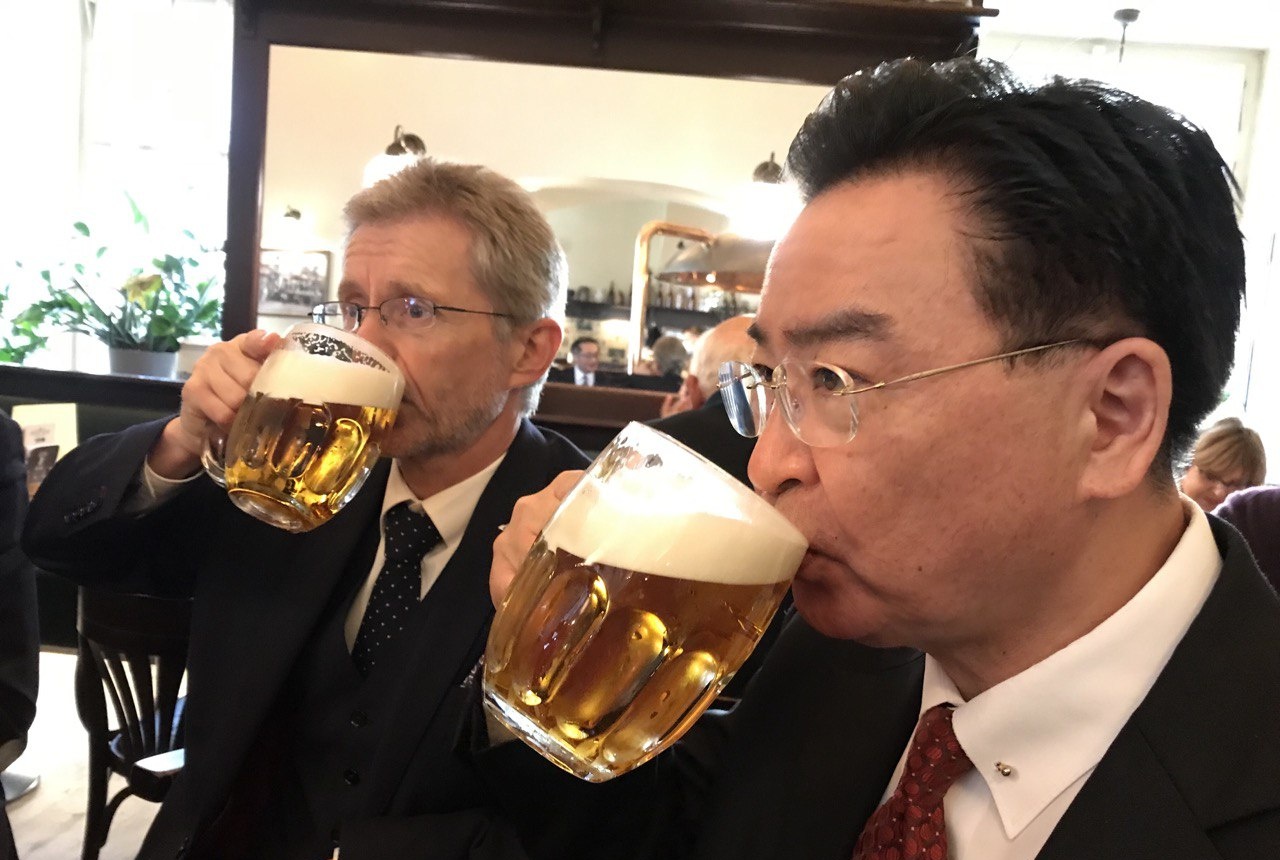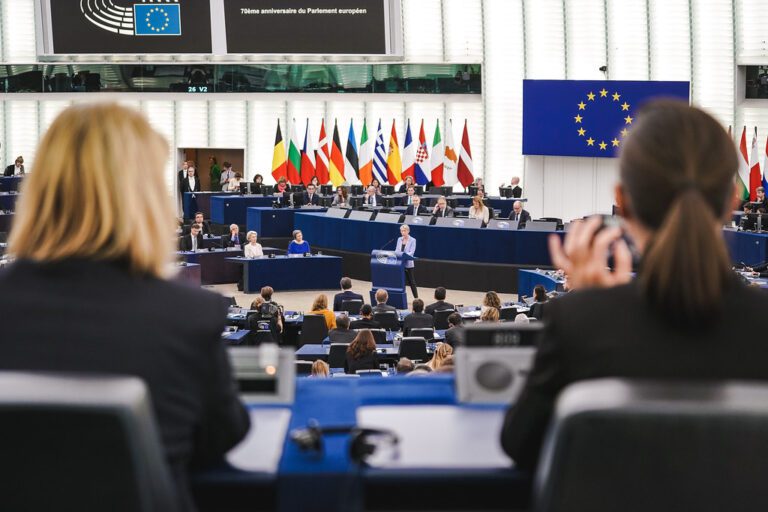
As the EU and some of its member states are increasingly willing to regard Taiwan as a partner and de-hyphenate their relations with Taiwan and China, authorities in Taipei have been equally eager to capitalize on this new positive dynamic. The most ambitious effort to do so of late was manifested in the travels of two official delegations across Central and Eastern Europe (CEE).
The first of these two parties to land in the region consisted of 66 representatives of the government and the private sector. The delegation, led by the National Development Council (NDC) Minister Kung Ming-Hsin, embarked on a three-country visit with stops in Lithuania, Slovakia, and Czechia. The second delegation was led by Taiwan’s Minister of Foreign Affairs Joseph Wu, who engaged in high-profile meetings and public speeches in Bratislava, Prague, and Brussels.
From medical diplomacy to strong affirmation of support for Taiwan in international discourse, cooperation with Taiwan by CEE countries is becoming increasingly substantive. The closeness is emerging as both sides appear to recognize their normative alignment and economic complementarities. It is important to consider, however, whether expectations for cooperation are fully aligned.
Taiwan has established a society-centered and value-based model of development, which views enhancing people-to-people contacts and capacity building as the foundation for facilitating economic cooperation. Yet, in a region largely disillusioned by cooperation with Beijing, Taiwan will face the challenge of precisely communicating the scope and timeline of its strategy and convince its partners of its alignment with their own goals, economic or otherwise.
Developing a “Democratic Supply Chain”?
The recent visits reveal two key areas of interest and complementarity in Taiwan-CEE ties.
Firstly, there is a convergence of values, emphasized on both sides. Secondly, one can observe an overlap in areas identified by both sides as key for economic development and diversification –with cooperation in science and technology emerging as the new priority.
This two-fold rationale for increased engagement between Taiwan and CEE was reflected in Foreign Minister Wu’s speeches delivered during his visit. While he described Taiwan as an “economic and technological success story,” Wu also stressed that shared values are crucial for the creation of a “democratic supply chain” that can “supercharge” democratic countries’ economies. As CEE countries are becoming increasingly wary of security risks associated with Chinese activities, including the issue of corrosive capital and investment, the emphasis on the normative aspect of Taiwan’s technological prowess allows Taiwanese officials to implicitly distinguish their approach from that of China.
As members of the NDC delegation signed a total of 18 memoranda of understanding (MOUs) with the three destination countries, in areas ranging from smart city development to semiconductors, European politicians also appeared to recognize the role of normative alignment in scaling up their economic ties with Taiwan. Lithuanian Minister of the Economy and Innovation Aušrinė Armonaitė described the MOUs as a sign that “protection of civil rights and economic prosperity go hand in hand.”
For Taipei, the emphasis on the normative dimension of economic cooperation is a deliberate strategy in realizing its foreign policy and expanding the country’s international space.
“The success of our outreach to Central Eastern Europe indicates that development of successful economic, social, and political ties with other partners depends not only on the complementarity of our interests, but also whether there is an alignment in our values,” Tsai Yi-Yu, a Member of the Legislative Yuan who sits on the Economics Committee, said.
Beyond Shared Values
Beyond emphasizing shared values, the recent dynamics in Taiwan-CEE relations also expose the importance of people-to-people ties in institutionalizing and scaling up the existing links.
Taiwanese expertise in strategic technologies, such as semiconductors and chips, is an important source of the growing interest in cooperation with the Asian nation. Nevertheless, there is a lingering gap in R&D and innovation capabilities of Taiwan and CEE countries, which highlights the need for capacity building and support for people-centric development.
Lithuania’s quest to attract Taiwanese investment in the semiconductor industry serves as a case in point.
Taiwan is assuming a people-centric approach to semiconductor capacity development in Lithuania. The announcement of a scholarship program for Lithuanian students to pursue training in semiconductors and the formation of an expert group to evaluate Lithuania’s role in the entire semiconductor supply chain are tangible effects of Taiwan’s outlook on fostering economic and technological partnerships.
Academic cooperation between Taiwanese and Lithuanian institutions is also intended to bolster the talent and research development capacity in the Baltic country. Toward this end, Taiwan’s National Sun Yat-Sen University is slated to serve as a nodal institution in the joint Taiwan-Lithuania semiconductor talent and research program.
Uneven Expectations?
Despite Taiwan’s holistic strategy for broadening and deepening ties with partners in CEE, there are doubts surrounding Taiwan’s actual ability to meet the expectations set by the delegations.
One source of these concerns is the history of Taiwanese involvement in the region. In the 1990s, the government in Taipei launched an “offensive on a grand scale” vis-à-vis CEE countries, which included provision of loans, politically motivated imports, and creation of Taiwanese industrial zones in the region. Nevertheless, these early and ambitious investment plans of the Taiwanese government never bore fruit.
Moreover, there are still issues with the generally low level of mutual understanding between Taiwan and CEE. This lack of awareness may translate into an imbalance in expectations for the growing ties – including the anticipation of a Taiwanese semiconductor plant in Lithuania.
“It is important to understand that technological cooperation will not bring immediate results,” Paul Lee, Chief Administration Officer of the Asia Silicon Valley Development Agency and one of the members of the NDC delegation, explained. “It takes time to build capacity and overcome administrative challenges. Cooperation should thus rely not only on direct investment, but also diversification of trade, knowledge sharing, and fostering strong people-to-people links.”
Lee also highlighted the significance of the address delivered by Hung-Tze Jan, Chairman of PCHome, Taiwan’s largest e-commerce platform. As the interest of Taiwanese customers in Lithuanian goods has grown following Vilnius’ vaccine donation, and while the Baltic country seeks to diversify its exports, Jan announced PCHome would launch a dedicated platform showcasing Lithuanian commodities to make them more easily available to Taiwanese consumers.
Easier access to the Taiwanese consumer market could not only bring about positive economic externalities, but also help close the knowledge gap between the general public in Taiwan and Lithuania.
“What we brought to Europe were opportunities, rather than checks,” concluded Lee, alluding to accusations that Taiwan was engaging in “dollar diplomacy” during the visits.
At the same time, while good intentions are important, they may not be sufficient. Both sides need to assess whether their respective expectations are realistic and aligned.
“[Taiwan] cannot rely on a one-size-fits-all model of engagement” as Lee pointed out, “We need to understand each country’s needs, level of development, and their current technological capacity.”
Consequently, active and transparent communication at government, academic, and business levels will be key for fostering future cooperation. While Taiwan is well-equipped to act as a reliable and like-minded partner in the region, there are still challenges at discursive and ideational levels.
The Path Forward
Taiwan’s simultaneous focus on shared values and economic interests has the potential to be well received in CEE, as countries in the region increasingly move away from rent seeking in their foreign policies to pursue a value-based approach. This multifaceted approach, which respects differences between individual host countries, was tested and bore fruit in other contexts, including cooperation carried out under the aegis of the New Southbound Policy, President Tsai Ing-wen’s key foreign policy initiative.
At the same time, while Taiwan is clearly ready to play the long game, its stakeholders need to actively engage with partners in CEE to regularly review and evaluate particular projects.
“MOUs express the intention[s] and will of both sides, rather than their abilities,” Dr. Yeh Kuo-chun, Professor in National Taiwan University’s Graduate Institute of National Development, commented. “[They] are, of course, a great achievement, but the way [of implementing] them is the key. That is why I stress the importance of having an informal but [also] real coordination mechanism between Taiwan and European countries to launch their MOUs and strategies.”
For example, while Taiwan’s government might be unable to intercede in private enterprises’ investment plans, it should actively liaise with CEE countries to reduce potential barriers and increase incentives for investors to those countries.
Additionally, while the delegations resulted in expansion of opportunities for talent from CEE countries to come to Taiwan, it is important that Taipei continues to build up CEE literacy at home. Under the NSP, Taiwan currently operates seven distinct programs for domestic talent incubation aimed at building up hard and soft skills necessary for successful engagement with the policy’s 18 target countries. Similar strategies, including sponsorship for internships in the CEE region and incubation programs for youth innovation, would also bolster the potential of emerging Taiwan-CEE economic cooperation.
Governments may come and go, but people stay. Relevant economic interactions will therefore rely on Taiwan’s ability to thoroughly understand the CEE region and clearly communicate the scope and timeline of its objectives. While Taiwan’s people-centric and gradual approach to economic cooperation has proven popular and sustainable in other contexts from Paraguay to Palau, time will tell whether CEE countries will want play Taipei’s long game.
Written by
Marcin Jerzewski
yehaoqinMarcin Jerzewski is the Head of Taiwan Office of the European Values Center for Security Policy. He is also a Marcin Król Fellow at Visegrad Insight. Marcin earned his Bachelor of Arts in Political Science and Chinese Studies at the University of Richmond and was an MOE Taiwan Scholar in the International Master’s Program in International Studies, National Chengchi University.


